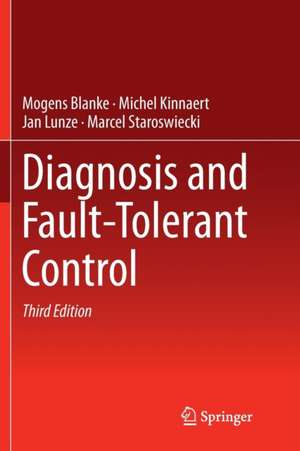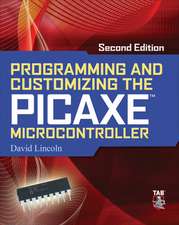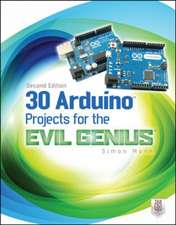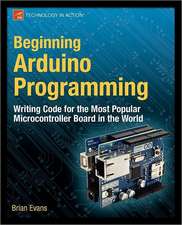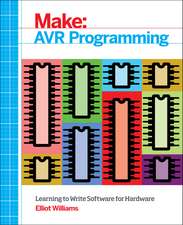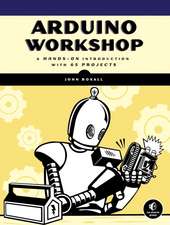Diagnosis and Fault-Tolerant Control
Autor Mogens Blanke, Michel Kinnaert, Jan Lunze, Marcel Staroswieckien Limba Engleză Paperback – 22 oct 2016
The book presents effective model-based analysis and design methods for fault diagnosis and fault-tolerant control. Architectural and structural models are used to analyse the propagation of the fault through the process, to test the fault detectability and to find the redundancies in the process that can be used to ensure fault tolerance. It also introduces design methods suitable for diagnostic systems and fault-tolerant controllers for continuous processes that are described by analytical models of discrete-event systems represented by automata.
The book is suitable for engineering students, engineers in industry and researchers who wish to get an overview of thevariety of approaches to process diagnosis and fault-tolerant control.
The authors have extensive teaching experience with graduate and PhD students, as well as with industrial experts. Parts of this book have been used in courses for this audience. The authors give a comprehensive introduction to the main ideas of diagnosis and fault-tolerant control and present some of their most recent research achievements obtained together with their research groups in a close cooperation with European research projects.
The third edition resulted from a major re-structuring and re-writing of the former edition, which has been used for a decade by numerous research groups. New material includes distributed diagnosis of continuous and discrete-event systems, methods for reconfigurability analysis, and extensions of the structural methods towards fault-tolerant control. The bibliographical notes at the end of all chapters have been up-dated. The chapters end with exercises to be used in lectures.
| Toate formatele și edițiile | Preț | Express |
|---|---|---|
| Paperback (2) | 604.37 lei 43-57 zile | |
| Springer Berlin, Heidelberg – 22 oct 2016 | 604.37 lei 43-57 zile | |
| Springer Berlin, Heidelberg – 14 oct 2010 | 963.29 lei 43-57 zile | |
| Hardback (1) | 752.88 lei 43-57 zile | |
| Springer Berlin, Heidelberg – 20 aug 2015 | 752.88 lei 43-57 zile |
Preț: 604.37 lei
Preț vechi: 711.03 lei
-15% Nou
Puncte Express: 907
Preț estimativ în valută:
115.68€ • 125.70$ • 97.24£
115.68€ • 125.70$ • 97.24£
Carte tipărită la comandă
Livrare economică 21 aprilie-05 mai
Preluare comenzi: 021 569.72.76
Specificații
ISBN-13: 9783662499863
ISBN-10: 366249986X
Pagini: 695
Ilustrații: XX, 695 p. 225 illus., 44 illus. in color.
Dimensiuni: 155 x 235 mm
Greutate: 0.98 kg
Ediția:Softcover reprint of the original 3rd ed. 2016
Editura: Springer Berlin, Heidelberg
Colecția Springer
Locul publicării:Berlin, Heidelberg, Germany
ISBN-10: 366249986X
Pagini: 695
Ilustrații: XX, 695 p. 225 illus., 44 illus. in color.
Dimensiuni: 155 x 235 mm
Greutate: 0.98 kg
Ediția:Softcover reprint of the original 3rd ed. 2016
Editura: Springer Berlin, Heidelberg
Colecția Springer
Locul publicării:Berlin, Heidelberg, Germany
Cuprins
Introduction to Diagnosis and Fault-Tolerant Control.- Examples.- Models of Dynamical Systems.- Analysis Based on Components and Architecture.- Structural Analysis.- Fault Diagnosis of Deterministic Systems.- Fault Diagnosis of Stochastic Systems.- Reconfigurability Analysis.- Fault Accommodation and Reconfiguration Methods.- Distributed Fault Diagnosis and Fault-Tolerant Control.- Fault Diagnosis of Discrete-Event Systems.- Diagnosis of I/O Automata Networks.- References.- Appendices.
Notă biografică
Mogens Blanke is professor in automation and control at the Technical University of Denmark and adjunct professor at Institute of Technical Cybernetics at the Norwegian University of Science and Technology. His research interests include autonomous and fault-tolerant systems, fault diagnosis and systems architecture design to obtain desired safety properties. Professor Blanke’s experiences include the development of fault-tolerant control for the Danish Ørsted satellite, for marine automation and control, for mobile robots and for diagnosis for small aircrafts. Professor Blanke is Technical Editor for Fault-Tolerant Systems for IEEE Transactions on Aerospace and Electronic Systems and he is Associate Editor for Control Engineering Practice.
Michel Kinnaert is professor in the Department of Control Engineering and System Analysis at the Université Libre de Bruxelles (Belgium). He has held a visiting professor position at the LAGEP at the Université Claude Bernard Lyon 1 and a postdoctoral position at the University of Newcastle (Australia). His research interests include fault diagnosis and fault tolerant control for linear and nonlinear systems with applications in the process industry, in mechatronics and in wind farms. Professor Kinnaert has been the chairman of the IFAC Technical Committee SAFEPROCESS.
Jan Lunze is professor of automatic control and head of the Institute of Automation and Computer Control at the Ruhr-Universität Bochum (Germany). His researc
h interests include fault diagnosis and reconfigurable control of discrete-event and hybrid systems, control theory with applications in the automotive and process industries, and networked control systems, where he has been the coordinator of a priority program of the German Research Foundation. He is author of numerous research papers and of monographs and textbooks on control theory, discrete-event systems and artificial intelligence with applications to dynamicalsystems.Marcel Staroswiecki is Honorary Professor of automatic control at the Université des Sciences et Technologies de Lille (France). He is the former head of the Laboratoire d’Automatique et d’Informatique Industrielle de Lille (LAIL-CNRS) and is currently with the Laboratoire SATIE-CNRS at Ecole Normale Supérieure de Cachan. Professor Staroswiecki and his group have been working on fault detection, isolation and recovery algorithms since 1986. His research addresses model, signal and data-based approaches to the supervision of complex and embedded systems with emphasis on structural analysis, intelligent instruments and components, and applications in the process industry and to transportation systems.
Michel Kinnaert is professor in the Department of Control Engineering and System Analysis at the Université Libre de Bruxelles (Belgium). He has held a visiting professor position at the LAGEP at the Université Claude Bernard Lyon 1 and a postdoctoral position at the University of Newcastle (Australia). His research interests include fault diagnosis and fault tolerant control for linear and nonlinear systems with applications in the process industry, in mechatronics and in wind farms. Professor Kinnaert has been the chairman of the IFAC Technical Committee SAFEPROCESS.
Jan Lunze is professor of automatic control and head of the Institute of Automation and Computer Control at the Ruhr-Universität Bochum (Germany). His researc
h interests include fault diagnosis and reconfigurable control of discrete-event and hybrid systems, control theory with applications in the automotive and process industries, and networked control systems, where he has been the coordinator of a priority program of the German Research Foundation. He is author of numerous research papers and of monographs and textbooks on control theory, discrete-event systems and artificial intelligence with applications to dynamicalsystems.Marcel Staroswiecki is Honorary Professor of automatic control at the Université des Sciences et Technologies de Lille (France). He is the former head of the Laboratoire d’Automatique et d’Informatique Industrielle de Lille (LAIL-CNRS) and is currently with the Laboratoire SATIE-CNRS at Ecole Normale Supérieure de Cachan. Professor Staroswiecki and his group have been working on fault detection, isolation and recovery algorithms since 1986. His research addresses model, signal and data-based approaches to the supervision of complex and embedded systems with emphasis on structural analysis, intelligent instruments and components, and applications in the process industry and to transportation systems.
Textul de pe ultima copertă
Fault-tolerant control aims at a gradual shutdown response in automated systems when faults occur. It satisfies the industrial demand for enhanced availability and safety, in contrast to traditional reactions to faults, which bring about sudden shutdowns and loss of availability.
The book presents effective model-based analysis and design methods for fault diagnosis and fault-tolerant control. Architectural and structural models are used to analyse the propagation of the fault through the process, to test the fault detectability and to find the redundancies in the process that can be used to ensure fault tolerance. It also introduces design methods suitable for diagnostic systems and fault-tolerant controllers for continuous processes that are described by analytical models of discrete-event systems represented by automata.
The book is suitable for engineering students, engineers in industry and researchers who wish to get an overview of thevariety of approaches to process diagnosis and fault-tolerant control.
The authors have extensive teaching experience with graduate and PhD students, as well as with industrial experts. Parts of this book have been used in courses for this audience. The authors give a comprehensive introduction to the main ideas of diagnosis and fault-tolerant control and present some of their most recent research achievements obtained together with their research groups in a close cooperatio
n with European research projects.The third edition resulted from a major re-structuring and re-writing of the former edition, which has been used for a decade by numerous research groups. New material includes distributed diagnosis of continuous and discrete-event systems, methods for reconfigurability analysis, and extensions of the structural methods towards fault-tolerant control. The bibliographical notes at the end of all chapters have been up-dated. The chapters end with exercises to be used in lectures.
The book presents effective model-based analysis and design methods for fault diagnosis and fault-tolerant control. Architectural and structural models are used to analyse the propagation of the fault through the process, to test the fault detectability and to find the redundancies in the process that can be used to ensure fault tolerance. It also introduces design methods suitable for diagnostic systems and fault-tolerant controllers for continuous processes that are described by analytical models of discrete-event systems represented by automata.
The book is suitable for engineering students, engineers in industry and researchers who wish to get an overview of thevariety of approaches to process diagnosis and fault-tolerant control.
The authors have extensive teaching experience with graduate and PhD students, as well as with industrial experts. Parts of this book have been used in courses for this audience. The authors give a comprehensive introduction to the main ideas of diagnosis and fault-tolerant control and present some of their most recent research achievements obtained together with their research groups in a close cooperatio
n with European research projects.The third edition resulted from a major re-structuring and re-writing of the former edition, which has been used for a decade by numerous research groups. New material includes distributed diagnosis of continuous and discrete-event systems, methods for reconfigurability analysis, and extensions of the structural methods towards fault-tolerant control. The bibliographical notes at the end of all chapters have been up-dated. The chapters end with exercises to be used in lectures.
Caracteristici
Merges principles of fault diagnosis with the emerging field of fault-tolerant control Enhances examples from real-world application and includes many more exercises Presents ideas in an intuitive way before they are expressed in rigorous mathematical form Includes many chapter-end exercises for lectures Includes supplementary material: sn.pub/extras
Recenzii
From the reviews:
"The book by Blanke et. al covers several model-based failure detection techniques. … A large portion of the book is devoted to presenting alternative modeling techniques. … the book is suited for those who want to begin researching failure detection and want to learn about some of the ideas examined recently in the literature." (IEEE Control Systems Magazine, Vol. 25 (1), February, 2005)
"There are many processes where overall failure would be expensive or even catastrophic and there is reason to use one of the techniques described in this book. … Some of the material is in fact published here for the first time. … The book under review must clearly be unrivalled as the standard textbook and reference source in its field." (Robotica, Vol. 22, 2004)
"The book introduces the main ideas of fault diagnosis and fault-tolerant control. It gives a systematic survey of the new methods that have been developed in recent years and illustrates them by application examples. It is important to mention that all major aspects of fault-tolerant control are treated for the first time in a single book from a common viewpoint. … With respect to fault accommodation and control reconfiguration, the book presents the current state of the art." (Tzvetan Semerdjiev, Zentralblatt MATH, Vol. 1023, 2003)
"The book by Blanke et. al covers several model-based failure detection techniques. … A large portion of the book is devoted to presenting alternative modeling techniques. … the book is suited for those who want to begin researching failure detection and want to learn about some of the ideas examined recently in the literature." (IEEE Control Systems Magazine, Vol. 25 (1), February, 2005)
"There are many processes where overall failure would be expensive or even catastrophic and there is reason to use one of the techniques described in this book. … Some of the material is in fact published here for the first time. … The book under review must clearly be unrivalled as the standard textbook and reference source in its field." (Robotica, Vol. 22, 2004)
"The book introduces the main ideas of fault diagnosis and fault-tolerant control. It gives a systematic survey of the new methods that have been developed in recent years and illustrates them by application examples. It is important to mention that all major aspects of fault-tolerant control are treated for the first time in a single book from a common viewpoint. … With respect to fault accommodation and control reconfiguration, the book presents the current state of the art." (Tzvetan Semerdjiev, Zentralblatt MATH, Vol. 1023, 2003)
